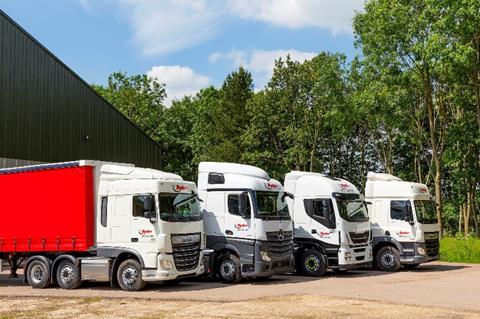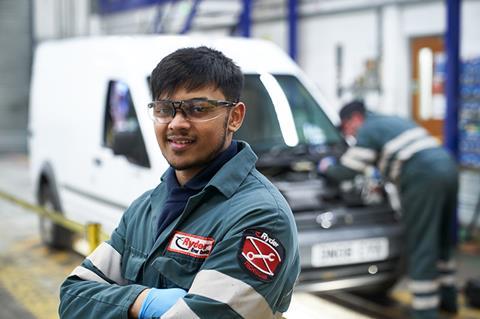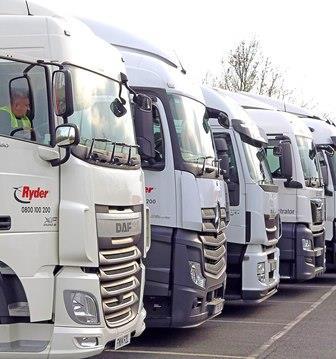
However hard or soft Brexit turns out to be in March 2019, the uncertainty the government’s handling of the process has created is already damaging the UK truck market.
Commercial vehicle rental and contract hire firm Ryder manages almost 20,000 assets in the UK and in the first nine months of 2018 it bought over 550 new rental vehicles.
“Are we buying any more rental trucks before Brexit?” asks David Hunt, pictured, vice president and MD of Ryder Europe when MT went to see him in September. “No. So with six month lead times we will add no more rental trucks to the UK fleet until October 2019 at the earliest.
“The last 400 Euro-5s will wash through in the normal cycle but we would be mad to buy any more trucks before Brexit.”
Although the UK is not (yet) officially in recession, the temptation to wait and see what Brexit will bring next year – plus added uncertainty over the impact of clean air zones - is making many truck buyers postpone orders for the foreseeable future.
“In a recession you know what you need to be doing,” says Hunt. “I'm not a natural ‘sit on your hands and wait’ type of person. But really all we can do is sit and wait.
“Right now we have no idea what the effect of Brexit will be. It might turn out to be a masterstroke in 20 years but in the short term everybody is planning for a bad 2019. So we will have a bad 2019 because we won’t be able to adjust quickly enough.”
Confidence
Uncertainty is usually good for rental and contract hire as fewer operators want to commit to purchases or long leases.
“The main thing next year for purchase of trucks is confidence,” argues Hunt. “On tractors, people will buy if they're confident about their contracts and their volumes. On rigids, there's a huge replacement bubble out there where people haven't refreshed their rigid fleets.
“That's for a number of reasons, but those 2014, 2013 and 2012 trucks are now getting to the point where they're just not economically viable to keep running.”
Ryder however cannot afford to wait too long before placing orders for new vehicles and ultimately Hunt has to make a call on what to buy when.
“We have to make the calls. We don’t use the asset as an end-user – we have to sell the asset. So this situation disproportionately impacts on us because we have to take positions and no position is a position in its own right. Being passive is a position.
“Logisticians are there to drive out waste from a supply chain. You either see that waste as stock holding, the number of people undertaking the task or the assets and working capital tied up in it,” says Hunt. “I said in 2008/09, logisticians make changes that you sometimes can only make when you're in difficult times and that will continue to happen.
“On the one hand, you've got higher or the same volumes and on the other you've got people coming up with smart ideas every year to reduce resources while maintaining or improving service.
“The name of the game is to maintain the same cost for an improved service or reduce cost and deliver a better service. My argument is that there'll be a continued overall net reduction in the number of trucks as logisticians do their job, re-engineering their supply chains.
“That's why it's so complicated for us to sit here and say what's happening. You've got that continued drive for cost reduction and then you've got big changes in regulation and consumer spending patterns impacting on the market.”

Ryder’s customers are suffering from the driver shortage, something that has got worse since the devaluation of the pound following the Brexit vote led to many eastern European drivers returning home.
“Operators are working trucks harder,” says Hunt. “Everybody wants their driver in a truck, delivering and adding value for their company. They don't want them doing any ancillary things like collecting vehicles from us.
“We have a service delivery model and relationships with customers. It's not that customers have got more awkward, it's the fact they haven't got any drivers. It's as simple as that. It's a self-imposed increase in efficiency because they haven't got any slack.”
White van man
One result could be that operators will replace the bread and butter 7.5-tonne delivery truck with two 3.5-tonne vans that don’t need HGV drivers or one 12-tonner that can carry more freight per shift.
“If you ask me that in a year or two's time, I will have a clearer picture,” says Hunt. “The 7.5 tonner is being affected because there are fewer drivers of our age who can theoretically just jump in one and drive.
“If you're going through all the tachograph compliance you want to be moving as much stuff as you can. Then you've got the option of the Daily and other equipment. Probably less than 50% of 7.5 tonners run full and if it’s half full you can put it in a large Sprinter van.
“There's nothing in the 7.5 tonner’s favour at all, other than it being the only thing that can drive down certain roads. If the government said an electric X-tonner can go down these roads you’d see 7.5 tonne demand fall off a cliff.
“The 7.5 tonner was the workhorse of the UK but it's going to be like any other truck in two or three years' time, where it's just a specialist asset bought for a specialist requirement. The workhorse asset of the UK today is white van man.”
The proliferation of unregulated vans could lead to O-licensing for light commercials, but that is some way off.
"We’re looking at whether that will change and it's five, maybe 10 years away,” Hunt says. “Obviously, the regulators’ first priority was to sort out the trucks, and vans have just been the Wild West. Anybody can buy a van in the UK, because there are no controls. Just get as many as you like and do what you like.
“I think it will continue for the foreseeable future because the politicians wouldn't want to upset white van man. But at some point society is going to be just as frustrated with the number of vans that are parked everywhere. So yes, it will change, but it's a while away.”
The impending implementation of clean air zones around the UK and the Ultra Low Emissions Zone in London has many urban HGV operators questioning whether a diesel vehicle bought today will prove to be a white elephant.
Euro-6 is good enough
“Euro-6 is good enough for the foreseeable future for the diesel going into the city,” says Hunt. “It's dramatically better there than anything else. Practically, if everybody was running Euro-6 trucks today the reduction in NO2 and particulates emissions from diesel engines would be astronomical. As to whether people feel that's good enough, nobody honestly knows.
“In reality, there is no option. There is no silver bullet. So for at least for one more buying cycle, there is no choice. In the end it just comes down to ‘I need to buy a truck today. My Euro-5 is eight years old. What options are there?’ They aren't any, you need to buy a diesel truck.”
Hunt is not an enthusiast of gas trucks which – while marginally better on CO2 in long haul applications – are usually no better on local pollutants than Euro-6 diesel.
“If you're talking particulates and NO2 reduction you haven't got a better option than getting yourself a diesel truck today,” he argues. “They’re all coming up for renewal, and they need to be bought. In six years' time, is there another cycle? Maybe, but there is no choice today.”
He does however believe that there might be a role for long-haul trucks running on biofuels as a means to reduce CO2 emissions.
“At the heavy end, when you're outside the cities where you're not having to think about particulates and NO2 as your number one priority, I think there's legs in alternative fuels like biogas,” Hunt says. “The OEMs are more open to it because it maintains their control of the drive train. It's still needs maintenance and it still needs parts. They'll be wanting to go down that less disruptive route.”
Electric the future
And while electric may be a viable low carbon alternative in the future, Hunt says it is too soon for most operators.
“There are only six eCanters in the whole of the UK at the moment,” he points out. “I'm not saying that it isn't coming, but I'm saying realistically how many electric vehicles is anybody going to buy in this refresh period?
“I'm not saying you shouldn't be trialling these things. If you need to buy 20 trucks, you may well buy a couple of electric trucks to have a play, if you can afford it.”
Leaving aside the sci-fi Tesla Semi, the US is ahead of Europe on the practical application of electric vehicles in urban settings. But Hunt has no plans to buy a gas or electric vehicle next year for his UK fleet.

“We’ve got 200 or 300 Chinese Chanje electric vehicles running in New York (pictured above) and San Francisco on our rental fleet, so we’re taking all the learnings from them,” says Hunt. “But both those cities have given large grants which makes it economically viable to buy an electric vehicle. There's no economic justification for an electric vehicle in the UK.”
So if Hunt is happy with his Euro-6 diesel trucks, what will Ryder’s van fleet look like in five years’ time?
“We are in a nice position overall on the heavy end, through a lot of hard work by the staff and management and support from America,” he says. “When it comes to 3.5 tonne electric vehicles, how do you enter that space?
“Everybody is doing trials but is it commercially viable? The answer at the moment is no, but everything else about it fits with Ryder's model. These assets are going to be expensive and they're going to be running for a long period of time. The asset management of them is going to be important. The maintenance is going to be lower but more complex.
“All that makes you say, at some point, Ryder is going to have to get into electric, and it's going to be that middle ground between the 3.5 tonner and 7.5 tonner. But we're going to have to think all that through very carefully before we'd be willing to put big cheques in there.”
Battery residual values
Ryder is already working with some of its key customers on electric vehicle trials but the big unknown for the ultimate owners of the vehicle is what if anything will be the residual value of the expensive battery packs.
“If one of our key customers came to us and said, ‘we've decided to trial 50 or 100 electric vehicles in London, and we want to partner with you on the infrastructure to achieve it’, then yes, we'd be willing to do that,” says Hunt. “Then it gets to the economics, and who wants to sit there with an eight-year-old battery when nobody knows what you can do with it.
“Ryder doesn't fear those conversations as much as some, because we're having the same conversations in the US. The reality is, people aren't ready to have those conversations yet. Ryder has been brave over these last four or five years in taking a market position and saying, ‘we want to be in this. What's the overall economic risk and can we stomach it?’ If we can, then let's have a good look and give it a go.”
Maintenance goes mobile
Since their launch in 2014, Euro-6 trucks have been steadily improved to be more reliable as well as being more fuel efficient, resulting in reduced repair and maintenance requirements.

“These latest Euro-6 trucks are running better than any trucks we’ve had before,” Hunt says. “What you're buying now is a pretty robust truck. Not only have you got to get all the Euro-5s out, you've got to get the first generation Euro-6s out too, but the overall level of maintenance required is getting lower and lower.
“There is going to be a lot of pressure on inhouse workshops as there will be less to do. We've put a massive amount of effort into our mobile maintenance capability through our Bullwell business so now we can do the work in our workshop, in a customer's workshop or on mobile vehicle, and we're ambivalent as to which one it is.”
Cost and age of trucks both on the increase
The rising cost of Euro-6 trucks has meant the average age of Ryder’s rental fleet has also increased to compensate.
“On the rental fleet we've allowed the rigid equipment to age, particularly the 7.5 tonners,” says Hunt. “It costs £10,000 to £12,000 more for a 7.5 tonner today than it did five or six years ago.
“You can't rent a tractor for more than £400, you can't do an 18 tonner for more than £350 and nobody wants to rent a 7.5 tonner for more than £250. Those numbers haven’t changed for the 25 years I've been in Ryder, so we explicitly didn't continue to reinvest heavily in the 7.5 tonners because we can't get anybody to pay for one.
“It's ridiculous, so we've let them age out, but we face the same issues as our customers in replenishing that fleet and we've got we've got to make some calls.”
When it comes to contract hire, Ryder has also allowed customers to run their trucks on at the end of their contracts.
“A lot of people think that’s good for leasing companies, and in markets with high interest rates and flat or improving residual values, that is absolutely the case,” says Hunt. “That's why the banks never ring you up to say ‘do you want to give your equipment back’ because when they've got a fat interest rate and peppercorn rent then it's happy days until you ring up and cancel it.
“But in this environment, with very low interest rates, deteriorating residual values and complex equipment, then extending contracts isn’t so attractive for us. But if we go and see a customer, they think they deserve a 10% discount for extending it.”
One thing Ryder won’t do is run unprofitable contracts and then try to claw the money back with high termination charges.
“Everybody thinks they're going to get mugged at the end,” says Hunt. “People are so used to all these promises at the beginning when they sign a lease with these fly-by-night companies. When the banks step in they want to charge you for taking it back to a perfect condition.
“Suddenly the whole reason of why they outsourced it falls apart. We believe in the long haul and we put the customer first. We don’t just pull a truck because it happens to be worth a lot of money in the marketplace and say, ‘sorry, you have to get a new one’.
“We own our assets and don't have somebody sitting behind us saying, ‘excuse me, that truck is actually mine’. We can do whatever we like with it. Over time we hope customers appreciate the flexibility we offer them. On our leases, we're way over what we'd like to run the trucks for because everybody's holding on to them due to all this uncertainty.”
Don’t read this if you run a lot of Euro-5 tractors
One truck dealer MT spoke to recently said UK operators had been “conned” into buying Euro-5 in 2014 after scare stories that Euro-6 would be more expensive, heavier and less fuel efficient. The result was a bubble of Euro-5 sales four years ago that has now burst as more cities demand Euro-6 for free entry into their clean air zones.

“There is a huge over-supply of tractors in the market,” says Hunt. “That’s not Brexit, that's not the economy, that’s just too many Euro-5s.
"We were nearly at the point where the CAP average price for a five year old Sprinter was better than a DAF CF.
“We didn't derogate any Euro-5 tractors and didn't over-extend ourselves. We still have a tractor fleet and carry about 800 or 900 tractors on rental, which we can take up to 1,200 for the Christmas peak. We're still in the tractor market, but when you see some of these companies that came out of nowhere with 2,000-tractor fleets, taking a punt on spot procurement and residual values, then a lot of them have had their fingers burnt.”
One million miles
In the last recession, many operators ran Euro-5 trucks on for up to seven years and over one million miles with no major problems, and OEMs often say a truck will do 1.2 million miles with no major component failures, but extended warranties get expensive at these mileages.
“In terms of the mileages, there is a very interesting dilemma. Everybody wants to keep on selling metal and the people who can afford to buy new want to run higher mileage over three years until the warranties run out,” Hunt says. “The trucks then get sold onto the next set of people who want to be out of them within 800,000 miles and nobody really wants them after 900,000 miles. So the people at the front want to run more, the people in the middle don’t want to run any less, and nobody really wants them at the end. The market doesn't work at the moment.
“Nobody will give you a guarantee that the engine will run for 1.2 million miles. The secondhand market for tractors is going to keep on going down. You can make money if you jump out at three years but really you need to run the truck longer in the UK to make the maths work.
“The rigid market has deteriorated but residual values are now stable at that lower value. You could say it was a hot market a while ago but now it’s a normal market. If you've got a decent mileage rigid you can get decent money for it. People shouldn’t get carried away that these clean air zones are going to be the end of the world. There is still a lot of metal out there but has everything fallen off a cliff on rigids? No it hasn’t.”















